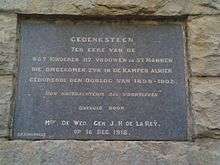Bittereinder

The Bittereinders (Afrikaans: [ˌbətərˈəɪndərs]) or irreconcilables were a faction of Boer guerrilla fighters, resisting the forces of the British Empire in the later stages of the Second Boer War (1899-1902).
By September 1900, the conventional forces of the South African Republic and the Orange Free State had been largely defeated by the British army. The remnants of Boer government resolved to fight on in a guerrilla war, to try to force the British to retreat from the territory. As it became clear that military victory was unlikely, opinion among the guerrillas divided between those who wanted to secure a negotiated peace and those who preferred to fight on to "the bitter end" (Afrikaans: bitter eind).[1] The decision to continue the fight was given particular motivation by British use of concentration camps.
Taken more generally, it could be used as another name for a "war party" (a faction within a political or military group favouring the waging of war) or for any group which does not wish to diminish its "fighting spirit" wanting to fight it out to the "bitter end."
See also
- Deneys Reitz — chose exile (in Madagascar) at the wars end rather than sign an undertaking that he would abide by the peace terms.
- Maritz rebellion (1914) — took place at the start of World War I by some Boers who were not prepared to see South Africa side with the British against the Germans (who had aided the Boer Republics during the Boer War).